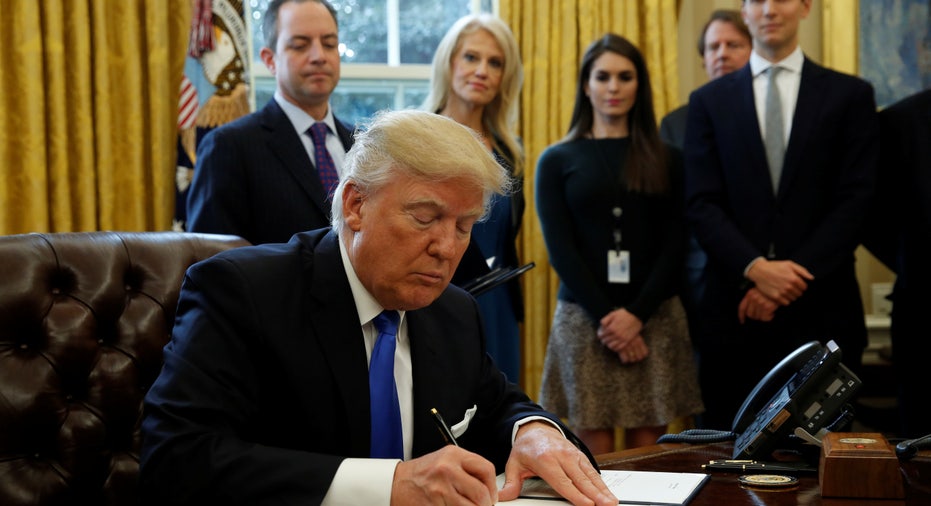Trump Issues Orders to Review Banking Law and Retirement Advice Rule

U.S. President Donald Trump on Friday ordered a review of banking regulations introduced after the 2008 financial crisis, including a review of a rule on retirement advice.
Trump pledged during his campaign to replace the Dodd-Frank law introduced under the Obama administration which raised capital requirements for banks, restricted their trading by means of the "Volcker Rule", and also created the Consumer Financial Protection Bureau.
A presidential order also imposed a 180-day delay on the implementation of a "fiduciary rule" for brokers offering retirement advice, according to a draft memo seen by Reuters.
During that time the U.S. Labor Department is to conduct an economic and legal analysis of the regulation and rescind the rule if it is inconsistent with Trump administration priorities, according to the memo, which is not final.
Originally slated to take effect in April, the rule requires brokers to act as "fiduciaries," or in their clients' best interests, when advising them about retirement plans.
The U.S. Chamber of Commerce and other trade groups are seeking to have the fiduciary rule overturned in court and a federal judge reviewing the case signaled in a court filing on Thursday that she plans to issue a decision no later than Feb. 10.
Democrats and consumer rights groups say the rule is necessary to protect individuals against potential conflicts of interest that brokers may have when guiding them to invest for the future.
U.S. Republicans on Friday also repealed a rule aimed at curbing corruption at oil, gas and mining companies and voted to axe emissions limits on drilling operations, part of a push to remove Obama-era regulations on the energy industry.
DODD-FRANK MOVE LARGELY SYMBOLIC
Trump's order on reviewing the 2010 Dodd-Frank Wall Street reform regulations may be largely symbolic though because only Congress can rewrite the legislation, but Wall Street embraced the possibility of simpler bank regulations by pushing financial stocks up in morning trade.
"The first thing that we are going to attack is regulation, over-regulation. It's not just in thefinancial markets, it's in all markets," said White House National Economic Council Director Gary Cohn on Fox Business Network on Friday.
"So today you're going to start seeing the beginning of some of our executive actions to roll back regulation in the financial services market," he said.
Dodd-Frank, the biggest Wall Street regulatory overhaul in decades, set out a long list of rules intended to keep the financial system from a repeat of the 2007-2009 crisis.
The rules included strict new capital standards on banks, called for annual stress tests for banks considered "too big to fail", provided more oversight of derivatives trading, and restricted trading on their own account by means of the so-called "Volcker rule".
The legislation also created new consumer protection watchdog to guard against predatory lending.
Analysts said Trump could make many changes without involving lawmakers, such as by appointing new personnel or simply choosing not to enforce rules already enacted.
"A lot of the regulations of Dodd-Frank required a bit of a cop-on-the-beat if you will, to ensure enforcement and if you have a different cop-on-the-beat, they enforce different rules, or they enforce the rules differently," said FBR & CO financial policy analyst Edward Mills.
Trump cannot fire heads of independent agencies, including the three top bank regulators: Federal Reserve Chair Janet Yellen, Comptroller of the Currency Thomas Curry, and Federal Deposit Insurance Corporation Chairman Martin Gruenberg.
In addition, the terms of Melvin Watt, director of the Federal Housing Finance Agency that oversees Fannie Mae and Freddie Mac, and Richard Cordray, the Consumer FinancialProtection Bureau director, extend beyond the end of this year.
Republican lawmakers are pushing Trump to fire Cordray, but a federal court's decision giving him power to do so has been stayed pending appeal.
Many prominent U.S. financial leaders support the Dodd-Frank law. Chicago Fed President Charles Evans said on Friday Dodd-Frank "has largely been helpful" and the stress tests have led to a banking system with "more and better capital."
Republican Congressman Sean Duffy said earlier this week that House Financial Services Committee Chairman Jeb Hensarling is expected to advance his CHOICE Act legislation to weaken Dodd-Frank later this month.
One Dodd-Frank provision ripe for Republican action is the "Volcker rule" that greatly restricts how banks can make bets with their own money.
(Reporting by Suzanne Barlyn and Sarah N. Lynch; additional reporting by Ayesha Rascoe, Richa Naidu, Lisa Lambert and Ann Saphir; Editing by Chizu Nomiyama and Clive McKeef)



















